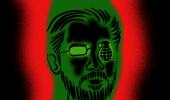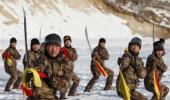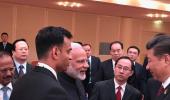'After shots were fired from the front, I ducked and shifted my position instinctively.'
'I had heard from other drivers that when stones are pelted at a bus the first target is the driver.'
Rediff'com's Prasanna D Zore speaks to Shaikh Salim Gafur, the driver of the bus, whose presence of mind saved many lives on the night of July 10.
Photographs and video: Hitesh Harisinghani/Rediff.com
- Part 1: 'It's time for another surgical strike'
- Part 2: 'I will rip apart those terrorists'
- Part 3: 'Modi will punish my mother's killers'

Shaikh Salim Gafur drove bus GJ09Z 9976 through a hail of bullets around 8.20 pm, July 10, when four terrorists -- we spoke to five eyewitnesses, but none could confirm this number given the panic when the firing began -- killed seven people.
There were 56 travelers from Gujarat and Maharashtra on the bus, on their way to Katra from Srinagar.
They had completed the Amarnath Yatra on July 8, proceeded to Srinagar the next day, and spent July 9 night there.
Had Salim not sped past the terrorists that night, the death toll may have been much, much, higher.
"The terrorists fired two rounds from the front. The windshield cracked and I could not see who was firing at us. As I sped past, the firing continued from my right," Salim recalls.

"Yogeshbhai (Prajapati, the tour manager) and Harshbhai (Desai, the son of the owner of Om Travels that organised this 20-day trip; when Salim ducked for safety three bullets hit Harsh: Two bullets brushed past his nose and one was lodged in his shoulder. He was recovering from an operation on July 13 when we visited him at the Kasturba hospital, Valsad) yelled out aloud to accelerate and I did."
"I don't remember what I was doing, but I hit the pedal hard instinctively," Salim told us at his home in Valsad's Police Headquarters area amid congratulatory calls from people who knew him, total strangers, and relatives of those who escaped unhurt that fateful night.
"I did what anybody in my place would have done," says Salim, who will reportedly be nominated for a National Bravery Award by Gujarat Chief Minister Vijay Rupani.
"I thank the Almighty to have given me that courage that night to duck quickly and increase the speed," says Salim who turned 37 on June 1.

Salim says he too asked Mukesh to close the door, but tour manager Yogesh Prajapati refutes Mukesh's claim that a terrorist was trying to enter the bus.
What happened after the Amarnath Yatra?
After doing the Amarnath cave darshan on July 8 we stayed the night there. When we left Baltal on July 9 it was already 11 am.
From Baltal we reached Srinagar around 4 pm. The passengers insisted they wanted to halt at Srinagar and go for sightseeing.
The tour operator then called a mini bus and the passengers went to see Srinagar.
The next day too people went out and came back only around 3 pm.
We thought if we started around 4 pm, then by 7 pm we would cross the Jawahar Tunnel and then there would be no tension.
The route till the tunnel is considered unsafe.

What happened after the terrorists attacked?
I kept speeding the vehicle. I was asked to keep driving the vehicle.
So I kept driving the bus till I reached the nearest army camp.
I asked the cleaner to close the door.
As I kept driving, I could hear the passengers cry out loud to stop the bus.
They were crying too, but I was sure I had to stop only when we reached the nearest army camp.
Were the terrorists wearing police uniforms?
It was so dark nobody knew what was happening or from where the terrorists fired at the bus.
At first, the spray of bullets sounded like fire crackers.
Two rounds were fired on the front window.
Since the windshield cracked I could hardly see who was in front of the bus.
I did not see anybody, but a few passengers said there were four terrorists firing from my right side.
I knew it was a straight road and the bus's lights were powerful enough for me to get some sense of the road ahead.
Then they fired from my right side and as I ducked three bullets hit Harshbhai and one hit the bus cleaner.
Had I not ducked, I'd have been hit too.
Unfortunately, Harshbhai was hit because I ducked.
When the conductor (bus cleaner) told me that somebody was running with the bus and trying to enter the bus through the door, I stepped on the accelerator.

The scene after the bus reached the army camp...
I could see blood at the rear of the bus. People were crying for help when the army entered the bus to help the passengers.
I helped the wounded passengers. My clothes were drenched in blood.
The army men took out those who were dead.
While the soldiers were evacuating people from the bus I saw 6, 7 army vehicles heading towards the spot in search of the terrorists.
I was told by one officer that a military vehicle which came along the same path a few minutes after we were attacked was also fired upon near that spot.
After we alighted from the bus nobody knew who was where.
People had no idea who was alive or dead.
Those who needed emergency medical attention were immediately shifted to Srinagar.
Those who suffered minor injuries were given basic medical aid and those who were not hit were asked to stay in the army camp.
Before the attack...
We were enjoying ourselves, but after what happened I am unable to believe that this has happened to people in my bus.
It is natural that the driver and passengers share a nice bond with each other.
Since I knew most of the places we visited before we were attacked, the passengers would often ask me about those places.
Meeting the family...
On July 11, my family was waiting for me at home when we returned to Surat at 10 am. From Surat I reached Valsad at 4 pm.
I could meet my family only at 1 am (July 12) because so many people had come to meet me.
I had already informed my family on the night of the attack not to watch TV and that I was safe.
I asked them not to get scared after seeing the news. I told them our bus was attacked and only a few windows and the windshield was broken.
I called up my brothers using the phone of an army personnel and asked them to inform my parents that nothing had happened to me.
On being a national hero...
There is already a lot of brotherhood between Hindus and Muslims in Gujarat.
Maybe, after this incident, because of what I did, the bond between the two communities will strengthen further.
I am fortunate to be alive today because we were going back after doing the darshan.

One grazed past his nose, the other one grazed past his stomach and the third one lodged itself in his left shoulder.
How was Harsh Desai hit?
Harshbhai was sitting to my left on the gearbox.
After shots were fired from the front, I ducked and shifted my position instinctively.
I had heard from other drivers that when stones are pelted at a bus the first target is the driver.
While I did not know when the firing started and that bullets were being fired at the bus, my first instinct was to duck for safety.
As I shifted and ducked, the bullets hit Harshbhai.
Had I not ducked, I too would have been hit.
We were driving at 50 to 60 km/hr when the firing started.
After that I stepped on the accelerator and increased the speed of the bus.
Some people shouted to increase the speed while others whose neighbours were hit shouted to stop the bus.
About the controversy around bus registration...
If that were the case, the army would have never allowed us to halt at the Jammu camp.
Two buses from Gujarat were asked to leave because they were not registered.
When the pilgrims reach Jammu camp all of them are sent for a medical check up to test their endurance levels at high altitudes and to find out if they can handle the stress of travelling at heights and in cold weather and if they suffer from breathlessness.
This is done at a government hospital. Once the tests are done hospital staff sign on a form which has the name, age and photograph of the pilgrim.
Once this is done the pilgrims have to go to either the Jammu and Kashmir Bank or the Punjab National Bank where darshan dates are allotted.
Once these formalities are completed, the pilgrims have to come back to the Jammu camp.
The army personnel check the vehicle for security purposes. Then they stick a yellow 'security checked' sticker on the bus in a way that it is clearly visible.
Then they put either a 'B' or a 'P' sticker depending on what you told the bank that one will be taking the journey via Baltal or Pahalgam.
After this, a sticker with the name and phone number of the military officer that accompanies the pilgrims is put on the bus.
His vehicle in the lead is followed by five or six army vehicles, which is then followed by the convoy of buses with pilgrims.
En route, the army keeps checking if the vehicles are following the time table that they are advised to follow.
If you check our bus today you will see all the necessary documents and stickers that are required for the journey to Amarnath.











 © 2025
© 2025